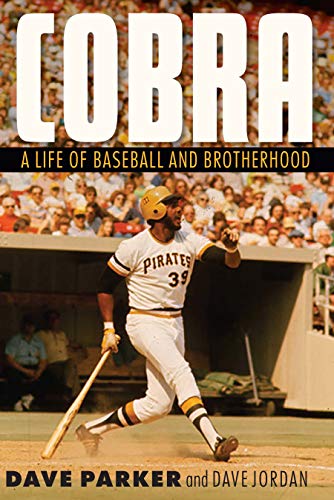Review by David Merkowitz
As a Cincinnati Reds fan in the 1980s and 1990s, the experience was almost like a fable out of Greek mythology. Once, giants strode the earth, but that was in the time before. Now, our ballplayers were mere humans.
In the 1970s, Cincinnati’s Big Red Machine dominated the National League, winning two World Series, making two appearances in the Fall Classic, and securing two division championships.
The likes of Rose, Morgan, Bench, Perez, and Concepcion were spoken of as the gods of another time. After the darkness spread across Riverfront Stadium in the early 1980s–with the dismantling of those great teams and the losses piling up–fans hoped for a return to the glory days. The second half of the 1980s ended up a pale reflection of those mythic times. One of the first players to come to his hometown team with the aim of restoring greatness was Dave Parker. A native Cincinnatian, Parker came to the Reds in 1984 after 11 years with the Pittsburgh Pirates. His time in a Reds uniform offered a bit of redemption after some ill-spent time in his later years with the Pirates.
Alongside baseball writer Dave Jordan, Parker’s own voice comes through quite clearly in much of Cobra. The book is strongest where Parker’s own experiences take center stage and his perspective is on full display. He reflects frequently on race relations inside the baseball world and with the larger public.
There is a touch of Greek myth in Parker’s own story. He was a five-tool player before that became common parlance. He could hit for power, hit for average, had a cannon-like arm, had speed in the outfield and on the basepaths, and locked down right field for the Pirates and the Reds. As Achilles’ ankle was seemingly his only weakness from when his mother had held him there when she dipped him in the River Styx, Parker’s knee was his own weak point, the knee. He injured it playing football in high school and the pain never let him forget about his mortality as an athlete. The pain of bad knees and the sting of racism from the fans when he was on top of the baseball world in the late 1970s are seen as the two contributors to his development of an addiction to cocaine that would eventually make the national news.
The desegregation of Major League Baseball by Jackie Robinson of Brooklyn Dodgers in 1947 is generally put on the list of signal moments along the way toward full equality for Black Americans. From 1947 when Robinson and Larry Doby took the field in the formerly all-white National and American Leagues until Dave Parker took the field in a Pittsburgh Pirate uniform twenty-six years later in 1973, professional baseball was fully transformed by the eventual full integration of the major leagues and the winding down of the Negro Leagues.
Parker’s story isn’t just a modern gloss on the Greek heroic drama; he was also part of the first generation of Black ballplayers to come of age after the Civil Rights Movement. The MLB never had more dominant Black players than in the 1970s and 1980s, of which Dave Parker was among the most prominent. From the mid-1980s to today, the percentage of Black Americans at the top levels of baseball has decreased precipitously. Major League Baseball has become more of a world game over the last generation, with players from throughout Latin America and the Caribbean making up a significant portion of rosters.
For those interested in the history of American sports culture, Cobra runs the gamut: the contrasting trajectory of football and baseball, the many-varied aspects of race relations after the Civil Rights Movement, the rise of the War on Drugs, the transformation of American professional sports due to powerful unions and the rise of free agency, and the impact of artificial turf on sport. A picture of Parker with a big-brimmed hat and t-shirt that read “If you hear any noise it’s just me and the boys boppin” has become a signal meme on social media as an artifact for the swaggering culture of 1970s baseball.
For the last ten years, Parker has been battling Parkinson’s disease. This book is his statement on his place in the baseball world and beyond. One can hope that this book lands in the hands of the Veteran’s Committee of the Baseball Hall of Fame and Parker eventually get to take his well-deserved place in Cooperstown.
In December 2024, the Classic Era Veterans’ Committee of the Baseball Hall of Fame voted to induct Dave Parker into the Baseball Hall of Fame in July 2025, alongside Dick Allen.

